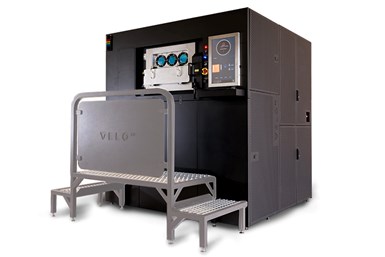Atomic Industries Invests in Velo 3D Printer to Produce Tooling and Dies
The Velo3D Sapphire Printer will be calibrated for M300 Tool steel and reside in Atomic Industries’ newly renovated facility, supporting the company’s aerospace, automotive and energy industry customers.
Atomic Industries, a creator of artificial intelligence (AI)-powered manufacturing solutions, has purchased a fully integrated metal additive manufacturing (AM) solution from Velo3D to unlock new capabilities and provide its customers with 3D printed tooling and dies.
The solution includes a Velo3D Sapphire printer that is calibrated to produce parts in M300 tool steel, an ultralow carbon alloy with high-strength and hardness properties derived from intermetallic compounds rather than carbon content. It is said this acquisition demonstrates Atomic Industries’ commitment to pushing the boundaries of precision engineering and advanced manufacturing to support its customers with the highest quality tooling parts for efficient, standardized production lines.
Atomic Industries employs state-of-the-art technologies such as artificial intelligence and metal 3D printing as it aims to reshape industries by offering more affordable and repeatable tooling. This transformation is designed to eliminate barriers for its customers transitioning products from prototype to production-level manufacturing.
The company’s Sapphire printer will operate from a newly renovated facility in Detroit, Michigan, helping produce tooling for aerospace, automotive and energy customers. It is said that Atomic Industries is the first company to qualify M300 tool steel for injection molding tooling with the Sapphire printer.
“Our new Sapphire printer will be instrumental in helping Atomic Industries tackle the tooling market by qualifying M300 tooling steel with our customers and showing the full capabilities of 3D printed tooling,” says Aaron Slodov, Atomic Industries CEO and co-founder. “We're excited to go hands-on and prove the robustness of the Sapphire platform with conformal-cooling inserts and other challenging features that will empower our customers. This strategic investment aligns perfectly with our commitment to innovation and pushing the boundaries of what's possible in manufacturing.”
M300 tool steel, with its combination of strength, toughness and resistance to wear, has been a staple in die-casting applications and tooling. By unlocking the ability to 3D print in this alloy with its fully integrated solution, Velo3D enables customers to manufacture better performing tooling inserts that minimize downtime on production lines by extending the life cycle of tooling inserts. The alloy is primarily used in high-pressure die cast inserts for injection molding, where molten metal must be efficiently cooled at precise times and temperatures.
Since its debut in 2018, Velo3D's Sapphire metal 3D printer has helped to redefine the metal AM landscape. It introduced printing capabilities like minimizing or even eliminating the need for supports. Velo3D achieved this by combining hardware, software and underlying manufacturing processes into a fully integrated solution that could achieve repeatable, consistent results across any Sapphire printer calibrated for the same metal alloy.
Related Content
-
3D Printing Molds With Metal Paste: The Mantle Process Explained (Video)
Metal paste is the starting point for a process using 3D printing, CNC shaping and sintering to deliver precise H13 or P20 steel tooling for plastics injection molding. Peter Zelinski talks through the steps of the process in this video filmed with Mantle equipment.
-
In "Hybrid" FIM Process, 3D Printing Complements Injection Molding
In a recent case study, Alpine Advanced Materials partnered with Nexa3D to produce 3D printed tooling for injection molded composites. Utilizing Nexa3D’s XiP desktop 3D printer and its Freeform Injection Molding process, Alpine was able to reduce prototype tooling production time and cost alike for its customers.
-
In Casting and Molding, AM Simplifies Conventional Manufacturing
In new ways, additive processes are streamlining and enabling metal casting and plastic injection molding.















